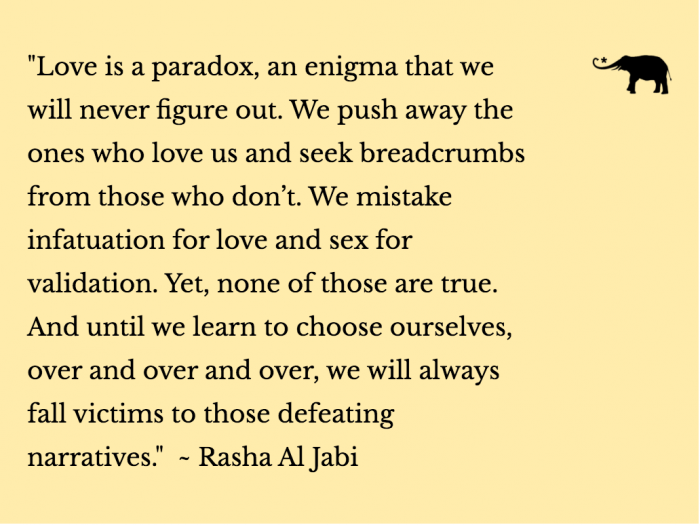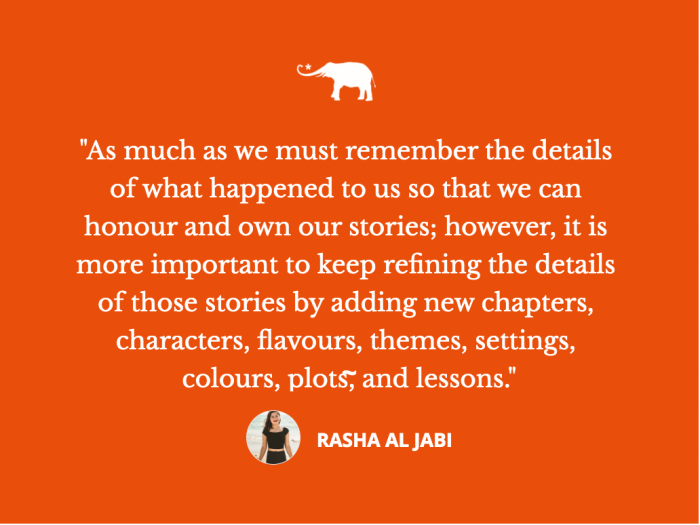View this post on Instagram
~
“Love is a decision, it is a judgment, it is a promise. If love were only a feeling, there would be no basis for the promise to love each other forever. A feeling comes and it may go. How can I judge that it will stay forever when my act does not involve judgment and decision.” ~ Erich Fromm
“I don’t think we can see each other anymore.”
I felt my heart pounding from the cavity of my chest as I typed these few words, then paused for a moment.
The silence was deafening.
A moment later, he replies, “Where are you now? Can I call?”
“Give me a few minutes,” I concluded.
I realized that writing about love isn’t my favourite topic, and for many, many reasons.
Toward the end of my 20s, I learned that shutting down my desire for love will help me move forward with life. A part of me despised the overly-attached, hungry for love, and sporadic self who felt constantly broken, wounded, and in desperate need of repair, particularly through romantic relationships.
Being methodical instead helped me carve many great qualities—masculine qualities to be precise. It helped me get out of debt, travel while being safe, work on an immigration plan, all while avoiding getting romantically entangled in a new love story that would hinder any progress I made.
It felt like the safe option at the time, and it was.
But my recent move to the West along with my decision to leave my comfort zone has left me feeling vulnerable, open, and exposed. It is one of the hardest journeys I had to embark on, not because of the geographic challenges or cultural barriers, but because of the loneliness, confusion, and readjustment that simply come with any journey.
Although I never doubt the accuracy of my decision, I question how far it would take me before I establish new roots here, whether I’d be able to build a support system, and if I’ll ever learn to call this place “home.”
When we feel vulnerable, we almost become hungry for affection, validation, and companionship. We long for another human being to recognize our own suffering. We look for reassurance that our life is still under control. But it doesn’t always work this way.
I moved here to find a new anchor, but I often feel like I’ve been shooting in the dark as I navigate the rules of a new city, how to extend genuine friendships in a cultural mosaic, and the complex, ever-changing terrains of the modern dating world.
Are people supposed to touch you a few seconds after asking for your name?
Is everyone only interested in sleeping around?
Is it normal for things to go this fast—faster than my nervous system’s capacity to process whether I do like this person, can navigate this situation, and see a potential in proceeding with a second date?
Is this even a date? It sure doesn’t feel like one.
Is this person for real?
Is he taking me for a fool just because I’m not from around?
And the list goes on.
Sometimes, I even think about writing daily comical essays about my love adventures in the city, especially in a post-COVID-19 era where everyone (including myself) seems to be hungry for human interactions, touch, and conversations.
Despite possessing an overactive nervous system, anxious-attachment style, a tendency toward people-pleasing, and my messy complex trauma which I’ve written about previously, I took the sound advice of my former therapist and one of my close friends of remaining open to experiencing life while knowing fully well that I would equally be exposing myself to great disappointments.
Seeking love doesn’t come with an instruction manual, and neither does understanding human beings, let alone people in a whole new city, in a whole new culture, and in the midst of a global pandemic where we’ve grown awkward about what we should and shouldn’t be doing around others.
I learned that the best we could do in any situation, really, is to understand ourselves better—our wants, our needs, our desires, our fantasies, our vulnerabilities, our longings, our weaknesses, our melancholy, our history, and our boundaries—so that we are able to communicate those to the people we’re interested in investing our time with.
As I untangle my own trauma, I realize that as much as we must remember the details of what happened to us so that we can honour and own our stories; however, it is more important to keep refining the details of those stories by adding new chapters, characters, flavours, themes, settings, colours, plots, and lessons.
What often keeps us stuck in our own narrative isn’t our incompetency to rewrite a new story, but rather our deep-seated belief that our woundedness, disconnection, isolation, shame, and self-loathing are the only narratives we deserve.
As Marianne Williamson said: “It is our light, not our darkness that most frightens us.”
For the longest time, the narrative I held onto was self-abandonment caused by the original abandonment I once experienced as a child, coupled with the complexity of growing up as a multicultural woman in a place that neither understood nor embraced cultural diversity. The shame I held onto, like a flaming piece of coal, originated from feeling undesired by both a family that did the best it could with what it knew and a culture that didn’t.
The Swiss philosopher and essayist, Alain de Botton, once wrote:
“Love is a skill, not just an enthusiasm.”
But most of us never learned how to hone this essential skill as needy, little children. And because many of us never got our attachment needs met, as that would have required the presence of an attentive, conscious, and mindful parent—a luxury which most parents didn’t have, we consequently never learned how to channel our natural longing for love and affection in healthy ways as adults.
Life is often complicated, and the longer we live, the more complex it gets just by nature of the unpredictable events that unfold before us. Most of the time, we’re never in charge of what life throws at us, but what we can attempt to control is our reaction to these events, and it all starts by getting to know ourselves better.
On a cognitive level, a part of me always knew that I am a decent human being who deserves a character who, while never perfect, is loving, kind, present, attuned, and curious about knowing me on a deeper level. It may never be ideal, but it will be good enough, which isn’t the same as compromising or settling for less than what we deserve.
But when the sharp pains of loneliness come pounding at my door at 5 a.m., 12 noon, or 6 p.m. on a random weekend afternoon, the visceral experience of feeling cut off is often too intense, burning, and suffocating. It echoes that any company is better than none.
In our moments of loneliness and desire, it is easy to mistake our longing with love and to confuse attraction with compatibility. There’s no shame in admitting that all of us, at some point in our lives, feel like we’re isolated from the rest of humanity, and, in those specific moments, to forget our values, lose our grounds, and throw our list down the window.
But what we must never compromise is fooling ourselves by believing that someone whom we chose at a moment of weakness can reflect the love we long to give and receive in return. It is a guaranteed way to self-abandonment, codependency, and grand disappointment.
The stories we tell ourselves have the power to shape our reality.
The other narrative I held onto was that I’ll never find (or don’t deserve) someone who is good enough, so I might as well settle for someone who is less than, and I almost did many, many, many times.
For years on end, I would succumb to bouts of familiar, deep shame every time I abandoned myself in a relationship by accepting, settling, and remaining silent about the things I needed but felt had no right to communicate.
I convinced myself it was because of my upbringing, it was because I didn’t know how to draw boundaries, it was because of my addiction to self-abandonment, perhaps as a desperate attempt to reenact my own trauma, and finally seek liberation.
Except for this time, I didn’t abandon myself.
As I ended that phone conversation, slowly put down my phone, and sat in our little garden, taking slow, intentional sips of my cinnamon warm water and savouring my freshly-picked blueberries, I was surprised at the sense of ease that engulfed my whole body. I felt overwhelmed by a surreal sense of melancholy, combined with euphoria, longing, and triumph.
What I had been obsessing about for days took me less than an hour to put an end to, and it only happened when the discomfort in my body from the night before beseeched me to choose a different story.
Love is a paradox, an enigma that we will never figure out. We push away the ones who love us and seek breadcrumbs from those who don’t. We mistake infatuation for love and sex for validation. Yet, none of those are true. And until we learn to choose ourselves, over and over and over, we will always fall victims to those defeating narratives.
We are social creatures who recognize ourselves best through the reflection we see in other people. As Elif Shafak said in her Sufi-inspired novel, The Forty Rules of Love, “Solitude is better for us, as it means being alone without feeling lonely. But eventually, it is best to find a person who will be your mirror.”
At the same time, no one ever said that the only route to finding real love is by forgetting who we are or, even worse, abandoning ourselves entirely. The psychotherapist who specializes in couples and family therapy, Esther Perel, said, “Healthy relationships require us to write often and edit well.”
So we must have the courage to constantly access our decisions, confront our setbacks, grieve our wounds, forgive our own mistakes, and meet our desires with love, compassion, acceptance, and, above everything else, accountability.
As we navigate the slippery slope of modern-day relationships, we must remember that there are no right or wrong answers. There’s only the narrative we choose for ourselves.
So let us choose to write often and edit well.









Read 19 comments and reply